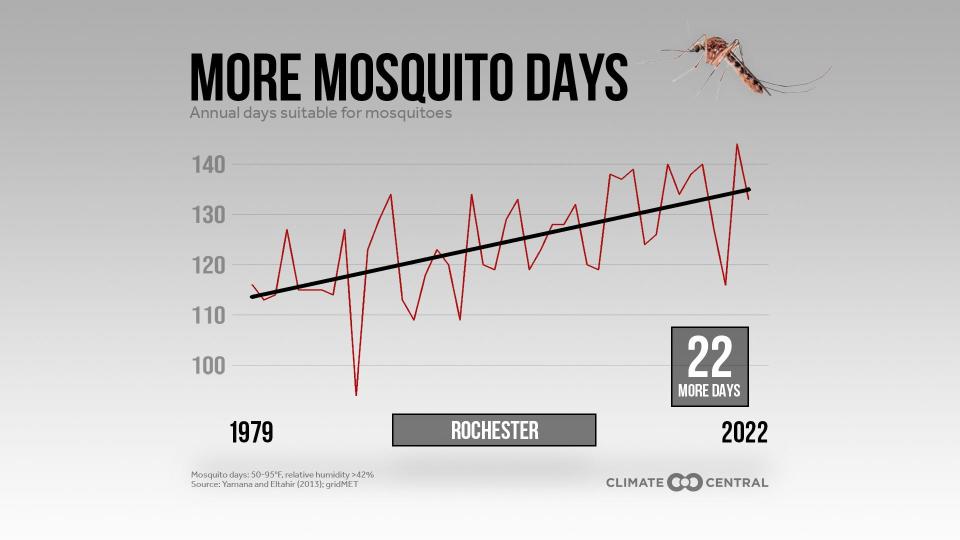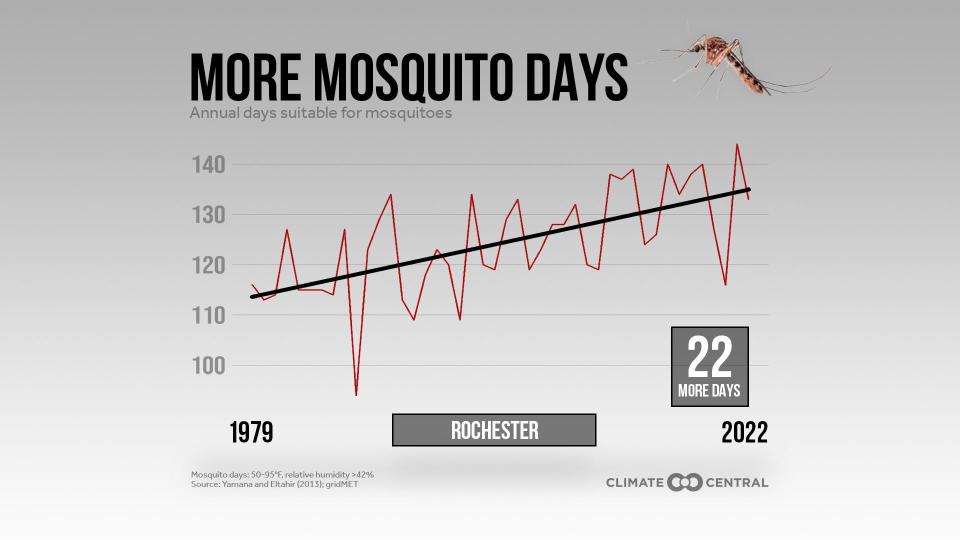
While Rochesterians were able to get outside in unseasonably warm weather earlier this month, some noted the early emergence of mosquitoes.
Different kinds of mosquitoes overwinter in different stages of life, with some surviving through the colder months as eggs and others, like those in the Anopheles genus, overwinter as adults. What causes mosquitoes to go into diapause, a period of suspended development, and emerge is still an ongoing area of study, said Kaitlin Stack Whitney, assistant professor and head of the Stack/Whitney Collaborative of Entomology, Environment, and Technology at RIT.
“Some of the cues that we know of for mosquitoes about when they go into diapause, or similar stages in the winter, may be due to light and dark hours, and not necessarily temperatures,” Stack Whitney said.
The research into basic life history and biology of many species of animals is not particularly well-funded, Stack Whitney said, and it’s even more important to understand how natural history is changing with the warming planet. The geographic ranges for different mosquitoes are changing, including ones that spread illnesses normally associated with tropical or warmer areas.
Climate change and mosquito activity
Warmer winters can lead to less snow but more heavy rain events, which can result in pooling water where eggs can be laid. Some mosquitoes, like the invasive Asian tiger mosquito, can lay eggs in as little as a quarter inch of water.
And winters are warming faster than any other season in the Northeast.

“Part of it is thinking about how our long-term patterns are changing,” said Stack Whitney. “As it gets warmer, the range of lots of insects we consider to be pests might be expanding and they may be able to overwinter in ways that make them come out earlier or that they’re surviving winter in ways they didn’t before.”
Mosquitoes are plentiful and varied in New York, with about 70 different species found throughout the state. That’s about a third of the species found nationwide, though only a dozen of those are disease-carrying.
Even within the state, most disease-causing mosquitoes are found downstate, Stack Whitney said. Southern parts of the country see a greater variety of mosquitoes carrying diseases like malaria, dengue fever and zika.
Mosquito-borne illnesses in New York
In upstate New York, the primary mosquito-borne illnesses of concern are West Nile virus and eastern equine encephalitis, which is rare but becoming more common.
There was a single human case of West Nile virus in Monroe County in 2023, though no mosquitoes positive with the virus were detected. However, no mosquito pools in the county were tested by the state Department of Health. There were no reported cases in the six bordering counties, but 32 total cases in New York, outside of New York City counties.
There were no cases of eastern equine encephalitis in Western New York, though there were cases in counties along the eastern border of Lake Ontario and the St. Lawrence River.
More: What are ‘lingering trees’ and why do they matter in NY?
More: What ‘devil bird’ sightings in New York tell us about migration and climate change
New York’s most common mosquitoes
The most common types of mosquitoes that can spread disease are the Ades, Culex and Anopheles species mosquitoes. The most common mosquito in New York is Culex pipiens, which feeds at dusk, night and dawn and can spread West Nile virus and eastern equine encephalitis.
Also known as the Northern house mosquito, culex pipiens typically stays within 300 feet of its breeding site, typically in pools of stagnant water. These mosquitoes mature from egg to adult in 7 days, with adults living an average of 10 to 60 days.
Another species of mosquito that has not been observed in upstate New York but has been sighted in several downstate counties is the Asian tiger mosquito. Aedes albopictus was introduced to the United States in the 1980s and has been expanding its range, primarily as a result of climate change, according to research by Cornell University. The same research found temperature may play a role in triggering dormancy in the species.
The Asian tiger mosquito was found in Orange, Rockland, Westchester and Nassau counties outside New York City, but nowhere else upstate with mosquito surveillance in the state in 2023.
Mosquitoes are pollinators
While mosquitoes get a bad rap for their role in spreading disease and as general pests, Stack Whitney is quick to remind that mosquitoes can be helpful for the environment, too. Mosquitoes are pollinators, just like honeybees, and some are particularly specialized; some varieties of Aedes mosquito pollinate orchids in New Jersey and the Adirondacks.
Mosquitoes aren’t just out in the ecosystem coming after humans, Stack Whitney said, especially male mosquitoes, which do not suck blood and feed on plant nectar. Only female mosquitoes need to consume blood and have larger, stronger proboscis capable of piercing skin. The female mosquitoes need blood to produce eggs, according to the Centers for Disease Control.
Some mosquito varieties bite humans but do not spread disease. These species are known as nuisance mosquitoes.
“Any insect we could name doesn’t fall into these easy categories of good and bad, but that doesn’t mean that we want to get disease from mosquitoes,” Stack Whitney said. “… We can appreciate that they’re orchid pollinators but also be talking about how we can find ways to be safer.”
— Steve Howe covers weather, climate and lake issues for the Democrat and Chronicle and his least favorite part of summer is mosquito bites. Have any insight into Rochester weather? Share with him at [email protected].
This article originally appeared on Rochester Democrat and Chronicle: Mosquitoes may appear earlier in NY due to warm winter months in 2024
EMEA Tribune is not involved in this news article, it is taken from our partners and or from the News Agencies. Copyright and Credit go to the News Agencies, email [email protected] Follow our WhatsApp verified Channel









